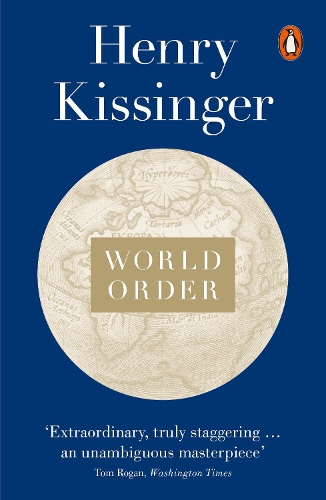
World Order: Reflections on the Character of Nations and the Course of History
(Paperback)
Publishing Details
World Order: Reflections on the Character of Nations and the Course of History
By (Author) Henry Kissinger
Penguin Books Ltd
Penguin Books Ltd
21st October 2015
3rd September 2015
United Kingdom
Classifications
Tertiary Education
Non Fiction
327
Physical Properties
Paperback
432
Width 129mm, Height 199mm, Spine 24mm
311g
Description
A major book on geopolitics by one of the world's best-known figures World Order is the summation of Henry Kissinger's thinking about history, strategy and statecraft. As if taking a perspective from far above the globe, it examines the great tectonic plates of history and the motivations of nations, explaining the attitudes that states and empires have taken to the rest of the world from the formation of Europe to our own times. Kissinger identifies four great 'world orders' in history - the European, Islamic, Chinese and American. Since the end of Charlemagne's empire, and especially since the Peace of Westphalia in 1648, Europeans have striven for balance in international affairs, first in their own continent and then globally. Islamic states have looked to their destined expansion over regions populated by unbelievers, a position exemplified today by Iran under the ayatollahs. For over 2000 years the Chinese have seen 'all under Heaven' as being tributary to the Chinese Emperor. America views itself as a 'city on a hill', a beacon to the world, whose values have universal validity. How have these attitudes evolved and how have they shaped the histories of their nations, regions, and the rest of the world What has happened when they have come into contact with each other How have they balanced legitimacy and power at different times What is the condition of each in our contemporary world, and how are they shaping relations between states now To answer these questions Henry Kissinger draws upon a lifetime's historical study and unmatched experience as a world statesman. His account is shot through with observations about how historical change takes place, how some leaders shape their times and others fail to do so, and how far states can stray from the ideas which define them. World Order is a masterpiece of narrative, analysis and portraits of great historical actors that only Henry Kissinger could have written.
Reviews
Henry Kissinger ... still has remarkable influence. Reading this book, you can see why ... the wit, clarity and concision of his chapters on Europe, America and jihadism are bracing * Economist *
Part history, part lecture, part memoir ... Kissinger's conclusion deserves to be read and understood by all candidates ahead of the 2016 presidential election. World order depends on it -- Lionel Barber * Financial Times *
Author Bio
Henry Kissinger served in the US Army during the Second World War and subsequently held teaching posts in history and government at Harvard University for twenty years. He served as National Security Advisor and then Secretary of State under Richard Nixon and Gerald Ford, and has advised many other American presidents on foreign policy. He received the 1973 Nobel Peace Prize, the Presidential Medal of Freedom, and the Medal of Liberty, among other awards. He is the author of numerous books and articles on foreign policy and diplomacy, and is currently Chairman of Kissinger Associates, Inc., an international consulting firm.
